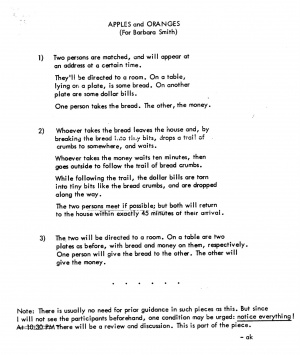User:Fako Berkers/project1: Difference between revisions
Fako Berkers (talk | contribs) |
Fako Berkers (talk | contribs) |
||
| Line 54: | Line 54: | ||
Now that I know more about wireless connections through Danja and Gordo's classes I was thinking that it might be exciting to listen to a public wireless connection (like the one from Rotterdam) and see what people browse on these networks. If you compare the surf behavior of different individuals you might be able to match people together and bring them into contact. The idea of the play would be executed in real life. I'm not 100% sure how this would work technically, but I will try to listen to some traffic soon and talk about the possibilities with the tutors. | Now that I know more about wireless connections through Danja and Gordo's classes I was thinking that it might be exciting to listen to a public wireless connection (like the one from Rotterdam) and see what people browse on these networks. If you compare the surf behavior of different individuals you might be able to match people together and bring them into contact. The idea of the play would be executed in real life. I'm not 100% sure how this would work technically, but I will try to listen to some traffic soon and talk about the possibilities with the tutors. | ||
==week 3== | |||
Revision as of 13:30, 18 October 2010
Week 1 and 2
I have a few ideas that I might want to work on. Some are in really early stages and I will not share them yet. But two are a little bit more mature and I'll describe them briefly below.
Performance space as a computer
The note by Alexander Galloway on code as a language that is executable reminded me of John Cage and performances of him I heard about. He wrote instructions for his performers for example:
"In a situation provided with maximum amplification, perform a disciplined action"
You could translate these instructions into code like language like:
BEGIN
sound.level = sound.maxlevel;
performance.action = "a disciplined action";
END
If you approach these instructions from a code point of view you can borrow concepts from programming languages (for instance procedures) to shape the instructions. This will make the instructions work differently. In the case of borrowing the concept op procedures the instructions become more dynamic:
PROCEDURE openWindow()
BEGIN
performance.action = "open a window";
END
PROCEDURE closeWindow()
BEGIN
performance.action = "close a window";
END
BEGIN
openWindow();
closeWindow();
openWindow();
openWindow();
closeWindow();
END
Looking at instructions this way turns the stage into a platform where the performers act as processors and you can create art by writing code.
Most people will know the work of John Cage and that of Allan Kaprow. LeWitt seems to be another artist concerned with code that executes art. I will have to broaden my knowledge about them and especially my knowledge about the people who came after them. With this theoretic research I hope to learn more about the possibilities of shaping instructions.
In the end this research may develop into a protocol that leads the performers. And as Alexander Galloway writes, this protocol has the potential to be a field of possibility where the performers can "hack" the protocol and break out of their impediment; showing creativity.
I like this idea a lot, because it appeals to my motto which is: "Freedom only exist in how you respond to what people do to you". Likewise freedom only exists in how as a performer/audience you deal with the protocol.
rotterdammers.nl
My second idea is about art facilitating contact between strangers. Sometimes I'm struck by the realization that everybody I meet on the street could be a valuable person to know in my life, but that I'll never know, because they'll always remain strangers to me. Reason enough for me to think how art may change this in my life.
The first thing I thought of (an idea from last year) was to make a performance about strangers that would automatically get into contact with each other through a site called www.rotturdammurs.nl, without them realizing exactly what is going on. I imagined the play to be about problems that might occur in online contact and would end with the announcement that everybody in the audience was now subscribed to www.rotturdammurs.nl and that they could check it out themselves to meet the strangers that are now sitting in the theatre.
Now that I know more about wireless connections through Danja and Gordo's classes I was thinking that it might be exciting to listen to a public wireless connection (like the one from Rotterdam) and see what people browse on these networks. If you compare the surf behavior of different individuals you might be able to match people together and bring them into contact. The idea of the play would be executed in real life. I'm not 100% sure how this would work technically, but I will try to listen to some traffic soon and talk about the possibilities with the tutors.

